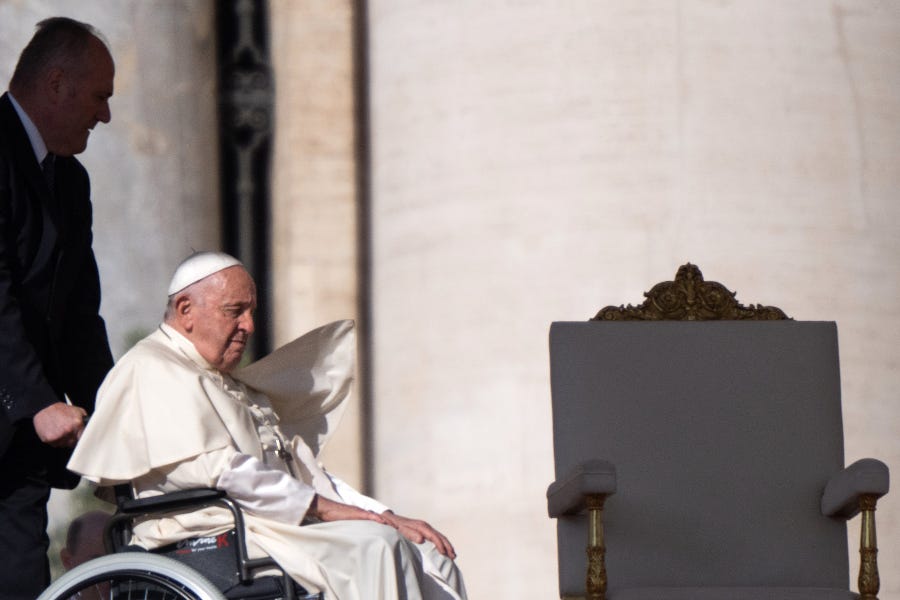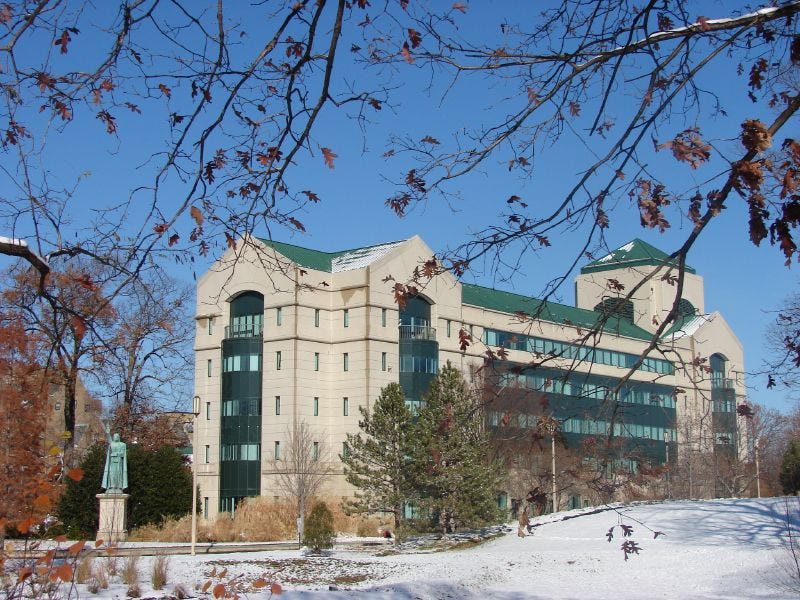Pope Francis, the Church learned Monday, answered the dubia.
Not — to be clear — the questions posed to him after the 2016 publication of Amoris laetitia — questions so long unanswered that “answer the dubia” has become a meme in some Catholic circles.

But the pope answered this summer another set of dubia — questions asked and answered back in July, pertaining to the synod on synodality, and released Monday in a kind of piecemeal fashion, with two sets of questions asked by five cardinals first reported by Italian journalist Sandro Magister, and then the Vatican taking the unusual step of releasing the pope’s answers to the first set of questions.
When he did so, the pope set off international headlines — and a great deal of controversy — regarding the prospect that he might permit the liturgical blessing of same-sex couples.
Of course, it’s a matter of debate whether Francis actually said something to merit that speculation. But on this issue, it’s worth looking beyond what Francis has said, to what he has done, and what he has chosen not to do.
There is a lot contained in the pope’s dubia responsa, with the answers to five questions spread across eight pages in the original Spanish. And while much of what the pontiff said he has said before, there will be debate over several topics addressed in the text — and debate over the dubia themselves, and what exactly the cardinals meant to accomplish by asking the pontiff questions and then, unsatisfied with his answers, rephrasing the questions and asking them again.
But the biggest headline to emerge from the story is the notion — repeated in both the Catholic and secular press — that Pope Francis has approved the prospect of “blessing” same-sex couples, signaled “openness” on the subject, or, as one newspaper put it, “softened” the Church’s “ban” on the practice.
The story came from language in the pope’s July 11 letter, published by the Vatican. In response to a question about whether it is possible for the Church to consider same-sex unions as “possible goods,” the pope wrote several paragraphs which emphasized that there are relationships — presumably same-sex relationships among them — which are “not morally acceptable.”
The pope added that “the Church avoids any kind of rite or sacramental that could contradict” its doctrine regarding marriage, or “give the impression that something that is not marriage is recognized.”
Still, Pope Francis also allowed for the possibility that some kind of blessing could be conferred on one or more Catholics in “not-marriage” unions.
“Pastoral prudence must adequately discern whether there are forms of blessing, requested by one or more persons, that do not transmit a mistaken conception of marriage. Because when a blessing is requested, one is expressing a request for help from God, a plea to be able to live better, a trust in a Father who can help us to live better.”
In short, the pope seemed to say, when people in an irregular union — perhaps a same-sex union — come to the parish for a blessing, it is worth discerning what they’re really asking for, and whether there is some way the Church can respond to that, even while avoiding the appearance of a nuptial blessing.
That idea got framed as a “softening” or an “openness” to the blessing of same-sex unions, and controversy erupted on Monday, across media outlets, among the commentariat, and across social media.
To some, the pope’s language is not entirely different from what the DDF said on the subject in 2021.
But some Catholics say the devil is in the differences — and that some small differences should be taken very seriously.
That clarification — which also came in response to a dubium — was widely seen as a surprisingly conservative move in the Francis papacy, hailed by many orthodox Catholics, and maligned by Catholics hoping that Francis would usher in change to the Church’s doctrine on homosexuality.
But while it prohibited liturgical blessings of same-sex couples, the DDF statement also affirmed that the prohibition on nuptial blessings did not preclude the possibility of “blessings given to individual persons with homosexual inclinations, who manifest the will to live in fidelity to the revealed plans of God as proposed by Church teaching.”
Some observers note that while the 2021 statement spoke about “individuals,” the 2023 responsa spoke about “one or more persons.”
And while the 2021 statement “declare[d] illicit any form of blessing that tends to acknowledge [same-sex] unions as such,” the 2023 statement made no such proviso.
Still, some argue that Francis didn’t rescind the 2021 statement — which was published with his explicit approval — and that the 2023 statement, and its seemingly limitless possibilities, are actually curtailed by the DDF statement — that the 2023 text should be read in light of the earlier statement on the subject, which could be understood as a kind of limiting principle.
But for some Catholics, Francis seemed to be broadening the scope of possible blessing well beyond the 2021 statement, allowing for the possibility that self-identified gay couples might receive together a kind of blessing that would, in some ways, resemble marriage — despite the pope’s explicit prohibitions of that possibility.
One observer called such a possibility “nuclear,” and others have pointed out that Francis risks an actual schism — or at least a concerted pushback from bishops around the world — if he adopts even a semi-official “don’t ask, don’t tell” policy on the prospect of liturgical blessings for same-sex couples.
Except, by appearances, the pope already has — at least tacitly.
—
Of course, only time will tell what the pontiff means about same-sex blessings in principle — his July 11 answer can be read in more than one way, and, indeed, it has been.
But in practice, it’s worth noting that Belgian bishops published last year a text allowing for a ritual blessing of same-sex couples, and the pontiff has — to date — not yet intervened.
Even while the pope’s 2023 responsa said explicitly that episcopal conferences should not produce such ritual texts, the pope has not intervened to stop the Belgian bishops from publishing one, stepped in after a German bishop said last month that he would not penally sanction priests who offer liturgical blessings to gay couples, or addressed a kind of protest-blessing performed by priests for gay couples in the cathedral plaza in Cologne.
That might be the point on which everyone can agree — that regardless of whether the pope’s July 11 letter was permissive or restrictive on same-sex blessings in principle, the pontiff himself has already been at least passively permissive on the subject in practice, without any public response to the European dioceses where the practice is quickly becoming enshrined as a matter of course.
While Catholics argue over whether Francis made his policy of toleration explicit in the July letter, it might not actually matter much.
Despite the scandal of official tolerance, or published ritual texts, at the diocesan and episcopal conference level, Francis seems content to work behind the scenes on episcopal discipline — if he is working at all — with no public statement on the decisions in Belgium and Germany.
In fact, few serious observers in the Church have expected that any clarity will come on orthopraxy regarding same-sex liturgical blessings until after a future conclave — Pope Francis does not seem inclined to address the pragmatic realities of bishops who are ignoring Vatican directives on the subject.
—
After the dubia — and the responsa heard round the world — most Catholics will be looking to the synod on synodality, to see whether Pope Francis will signal again more openness to the prospect of liturgical blessings for same-sex couples.
The pope likely won’t. And while he might be asked about it on his next airplane trip, and he might offer more reflections, it’s not likely they’ll be concrete. It’s most likely that when he speaks about the subject, the pope will continue to focus on welcome, and pastoral discernment, without elaborating on the clear limits that might give definition to his reflections, but making some reference to the 2021 statement when pressed.
In short, his future reflections are most likely to be vague enough to be subject to broad interpretations.
It is not clear that the decisions of Belgian bishops, and the clergy in Germany, reflect what the pope actually thinks about the issue of liturgical blessings for same-sex couples. But the pontiff is more than a theologian — he is the governor of the universal Church. And some Catholics will be looking closely in the months to come at the parishes of Flanders, and the cathedral square in Cologne.
There, the question will be not what the pope chooses to say, but what he chooses to do — if anything.




